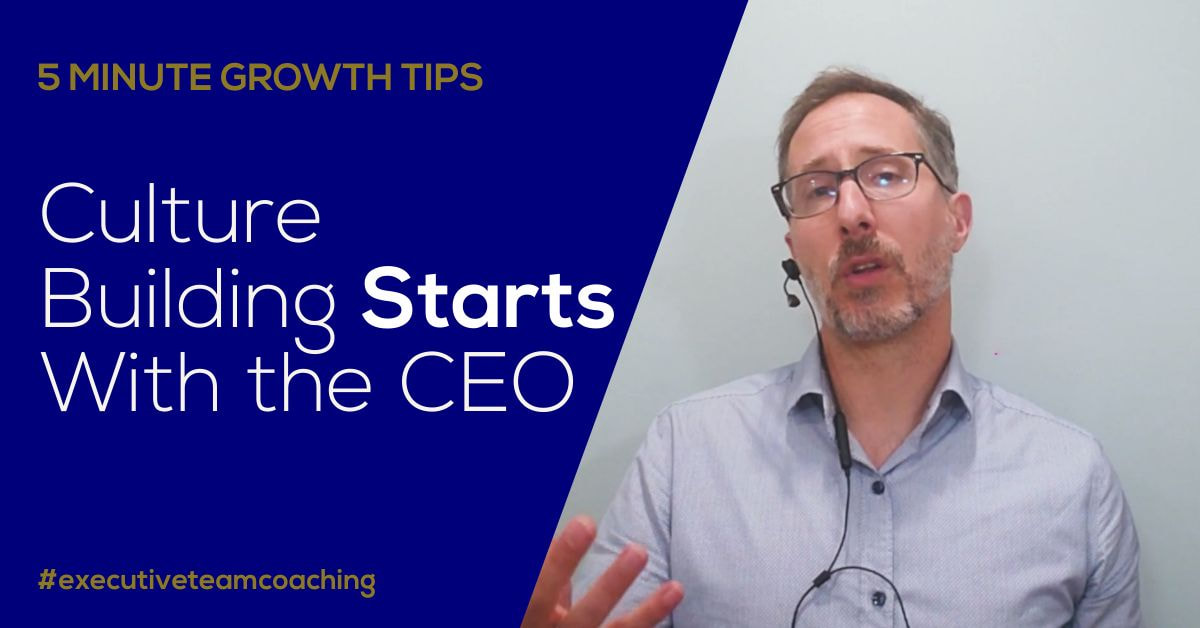|
In my work with the CEOs and Executive Teams of mid-size companies, I’ve often met CEOs who think it’s HR’s job to build the culture. They say “Oh that’s people stuff – so that’s HR’s job.” And that’s a big mistake. It’s actually the CEO’s job. Why is that? As the first featured speaker on Innovation Place’s new Brain Bites mini-video series, I shared what my colleagues and I have seen and what we teach as executive team coaches on this topic. Watch the 4 minute video here, or read the article below. The fundamentals
Let’s start with what culture really is, why it’s important, and how we build it. When you strip it all down, a company’s culture is how people, in the company, behave. Culture is important because the more that people behave in similar ways in a company, the faster the company moves. The more peoples’ behaviours are different, the more unproductive conflict there is and the slower the company moves. This is what a strong culture means. it’s one where people behave in similar ways. How do we create a strong culture? With core values. What are core values, really? Core values are a handful of rules we define to help, guide, employees’ behaviour – our culture. To get people to behave in similar ways, according to the core values – meaning to build a strong culture – the leaders have to do 3 things: - define the core values - repeat them often - live by them themselves Culture comes from leaders’ beliefs One mistake companies often make is they come up with core values that are about who they want to be, what sounds impressive, or what would look nice on their website. But that doesn’t work. Because the leaders won’t behave according to those core values, because they don’t believe in them. If the leaders don’t believe in them and don’t live them, employees won’t either. Because employees don’t do what leaders say, they do what leaders do. So if you want your company’s core values to help guide your employees to do what you do, the core values need to reflect what you really believe, and you need to behave according to those core values. HR can support, but the CEO should lead Putting HR in charge of culture takes this process out of the hands of those who really need to own it and lead it – the senior leadership team. And who needs to own the core values the most and believe in them the most? the CEO. Because the CEO will need to be the top ambassador of the core values, live those values him or her self fanatically, and hold the executive team members accountable to live them too. HR can support the CEO and leadership team’s culture building activities. And certainly, HR’s processes and policies, like employee selection and performance evaluation, need to align with the core values to help build a strong culture. But every process and policy, in every function or department, needs to align with the core values, not just HR. And even more important than the processes and policies is how the leadership team members behave – starting with the CEO. If those behaviours match our core values, people in the company will behave in similar ways – that is, the culture will get stronger, and the company will move faster. What if the CEO is too busy? If you’re a CEO, you may be thinking “but i’m too busy to build the culture”. Maybe so. And why are you too busy? Are you firefighting? Are you dealing with unproductive conflict? Are you dealing with problem employees? Chances are, a part of the reason you’re too busy is because you’re dealing with the symptoms of a weak culture. Strengthen the culture, and your job gets easier, and everyone else’s does too. And that’s why it’s the CEO’s job to lead culture-building. Are you ready to grow a great top team, company and life? Try our Growth Readiness Self-Assessment to find out where you, your top team and company shine and where you could improve in order to grow, improve profitability, consistency and your quality of life. Comments are closed.
|
Archives
December 2029
Categories
All
|


 RSS Feed
RSS Feed
